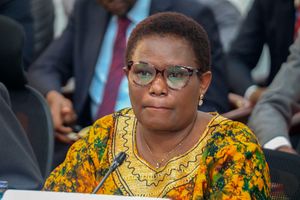
Nairobi governor Johnson Sakaja
Unlike most governors across the country, whose parties enjoy numerical strength in county assemblies, and as such have undivided loyalty to those political parties, Nairobi's Johnson Sakaja is literally walking a tight rope.
The first-term county boss faces the tough exam of keeping ward reps from his Kenya Kwanza coalition happy and at the same time please Azimio One Kenya coalition, the majority party, as he runs the affairs of City Hall.
To observers, he appears to have done it well, but with occasional run-ins with Kenya Kwanza coalition and Deputy President Rigathi Gachagua who never forgets to remind Mr Sakaja of the numerical strength of his central Kenya backyard and its contribution to the city’s economy.
“Ever since we elected Mr Sakaja, he embarked on decisions that are not in line with our manifesto. These decisions are punishing our people. He has abandoned all the plans that we had for Nairobi,” Mr Gachagua said in a recent vernacular TV interview on Inooro TV.

Nairobi Governor Johnson Sakaja during an interview at his office in Nairobi on April 26, 2024.
Azimio One Kenya coalition is the majority coalition with a total of 68 ward reps while Kenya Kwanza has a total of 53 MCAs. Three are independent.
Immediately after being sworn in, Mr Sakaja knew the rock and the hard place that he was in.
As such he tapped some men and women who worked or were involved in the Azimio campaign for his Cabinet— including Michael Gumo (Innovation and Digital Economy), Ibrahim Auma Nyangoya (Health Facilities), Rosemary Kariuki (Inclusivity and Public Participation).
But this appears not to have gone down well with Mr Sakaja’s Kenya Kwanza coalition who at some point disrupted the vetting process for some of the candidates perceived to be from Azimio.
Mr Gachagua is among the Kenya Kwanza leaders who have been accusing Mr Sakaja of failing to deliver on behalf of the voters.
His allies, including Embakasi North MP James Gakuya and Embakasi Central MP Mejjadonk Gathiru, have been at the forefront in opposing Mr Sakaja’s management style in the city.
“Nobody should question our interest in Nairobi. If it is not thriving, we will not be happy,” Mr Gachagua told a political gathering of women leaders in Nairobi in April.
In the same month, at least 10 officials from UDA party – led by lawmaker John Kiarie – accused the county boss of mismanaging the affairs of the Kenyan capital, alleging incompetence, corruption and arrogance.
They accuse him of failing to fix Nairobi’s long list of problems, including widespread sewerage issues, garbage mess, water shortages and flooding.
“Nairobi is facing its worst leadership crisis in history. The promise of a city of order, dignity, hope and opportunity has turned into a nightmare,” said Mr Kiarie
“We want relevant audit, oversight and investigative bodies to swiftly intervene and rescue Nairobi from the shackles of rampant mismanagement and incompetence.”
In the Inooro interview, Mr Gachagua came to the defence of soke of the MPs insisting that what they were doing was right.
“The Honourable member for Embakasi North Gakuya and Embakasi Central Mejja Donk are people who are saying the truth about what is happening in Nairobi,” Mr Gachagua said last week.
Reached for a comment, Mr Sakaja on Thursday defended his working relationship with Azimio, saying he held meetings with members of his party to explain why working with the opposition would help service delivery to Nairobians.
“It means engaging in an open consultation. You engage the elected leaders and their party leadership. In the beginning, I had more problems with my own UDA, but when we had negotiations with the majority side on the sharing of the House committees, they realized they all stand to benefit by working together,” he said.
Mr Sakaja also believes that being able to work with leaders from both sides of the political divide is redefining politics in the country.
“I am not ashamed of being able to talk to leaders across the divide. In Kenya, leadership and politics have been taken to be an enmity. But politics should not be an enmity. It is a contest of ideas,” he added.
Makadara MP George Aladwa is one of the Nairobi MPs who have defended the performance of Mr Sakaja.
"We as a party are fully behind the leadership of Governor Sakaja. We are very supportive of his development agenda," Mr Aladwa said.
Others supporting Mr Sakaja are Embakasi West MP Mark Mwenje, Kapsaret MP Oscar Sudi and Ruaraka MP Tom Kajwang.
A defiant Mr Sakaja has however maintained that Mr Gachagua’s style of leadership is one that consists of “bullying” other leaders.
"I've been through a lot and I'm not easily intimidated, nobody has the right to say I was given the seat. I was elected. You can't bully people for two years and then start crying when you are mentioned in one week." Mr Sakaja said in May this year at the height of the fallout between himself and the deputy president.
The war also spread into the county assembly where attempts were made to dislodge Mr Sakaja allies from their leadership positions.
In October last year, the United Democratic Alliance (UDA) kicked out minority leaders at the Nairobi City County assembly, most of whom are close allies of Governor Johnson Sakaja.
The leaders ousted include Mr Anthony Kiragu serving as the minority leader and Mr Mark Mugambi who is the chief whip in the county assembly. Nairobi South MCA Waithera Chege was named as the new Minority Leader while nominated MCA Joyce Waithera was named the new minority whip.
The ousting of the leaders however hit headwinds when the Nairobi City County Assembly speaker failed to communicate the changes by the UDA party according to the standing orders thereby failing to make it official.
Mr Sakaja later embarked on a plan to control the UDA party when he announced to vie for the chairmanship position in Nairobi County. The plan however ran into headwinds after the UDA postponed the election indefinitely.
Mr Kiragu, who is the assembly minority leader, believes Mr Sakaja’s has performed well in striking a political balance.
“The governor has done well in tackling the issues that affect the county government. The reason there are no conflicts is because the assembly with its unique arrangement is focusing on what matters to the people of this county, not partisan agendas. He has delivered for the city residents and some people are afraid of his performance” Mr Kiragu told Nation.Africa.
Majority Leader Peter Imwatok says as the Azimio coalition, they are focused on supporting Mr Sakaja’s agenda for the city residents.
“Nairobi City County assembly is unique where Azimio, which is the opposition party, is now the majority— meaning that we are supposed to support Mr Sakaja achieve his Kenya Kwanza manifesto for Nairobi while the minority, which is Kenya Kwanza, is supposed to criticize him but we are happy as the assembly leadership that we have not had any fights like it was previously,” Mr Imwatok said.
Ms Waithera Chege, the deputy minority leader, said there were a few MCAs who are willing to come out to criticize the county administration for failing to deliver its promises.
“This is the worst mistake that the UDA party made. It has become clear that the county governor does not care about Nairobi at all. There is nothing to really talk about because he has never delivered,” she says.
Ms Waithera also argued that the interference of the county assembly by the county executive has crippled the work of the MCAs who are supposed to play an oversight role.
“What we really need to fight for is the independence of the county assembly so they do not need to depend on the executive. We have tried making changes to build a robust county assembly but they have always hit headwinds. The mandate of the MCAs has never been fulfilled,” Ms Waithera told Nation.Africa.
Political analyst Fred Ogola, however, argues that his ability to gain the favour of a section of UDA and Azimio MCAs has given him smooth sailing at the cost of good services to the City residents.
“Who is going to hold the governor accountable? Politics depends on the goodwill of the political father heads and Mr Sakaja has blessings from both Raila Odinga and William Ruto, he knows how to play his cards. All MCAs are aligned to the two and a few can dare go against the governor,” he says.
Professor Ogola also opines that the juggling of two balls by Mr Sakaja has also impacted his delivery of the county government services.
“Mr Sakaja is just a governor on paper. He is suffering from a political imbalance, which has made it difficult for him to deliver,” Prof Ogola told Nation.Africa.
“Remember in Nairobi County, ODM is the majority and he comes from Kenya Kwanza. He has to meet the demands of Mr Odinga and that of Dr Ruto and this has denied him the opportunity to govern and make decisions for the betterment of the lives of the residents. He is held hostage.









